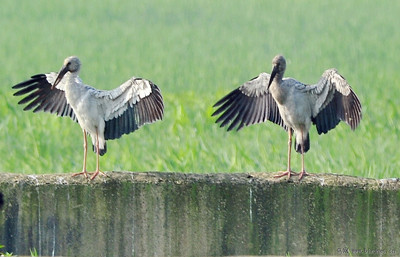(单词翻译:单击)
听力文本
Humans aren't the only creatures who love junk food—many animals are known to enjoy sifting through our garbage to find edible treats.
And now we learn that some storks have stopped migrating from Europe to sub-Saharan Africa in the winter—they'd rather feed at landfills.
“They use landfill sites heavily during the winter and they travel very long distance to get to the sites.”
Aldina Franco of the University of East Anglia, one of the scientists who studied the storks' use of landfills in Portugal.
GPS tracking devices on 17 birds showed that the landfill life might mean up to 100-kilometer round-trips to feed—healthy distances, but far shorter than their historic migration routes.
“And also they use the nests throughout the year and look after the nests.
So these resident birds are in perfect condition, they are always ready to start breeding.
So as soon as spring arrives they're ready to go, the nest is in good condition, and they start breeding earlier.”
The number of storks overwintering in Portugal has shot up from fewer than 2,000 in 1995 to 14,000 in 2014.
The increase appears to reflect both changes in behavior and a booming stork population in general.
The study is in the journal Movement Ecology.
The Portuguese landfills are slated to close in 2018, with the trash diverted to covered recycling and composting facilities.
How will the storks respond?
Franco thinks they'll get back to basics.
“So the storks are social animals.
They live in colonies.
They migrate in groups.
So potentially as long as there are a few birds that still know the route, they can teach the ones that are currently residents how to migrate.”
参考译文
不仅人类喜欢垃圾食品—许多动物也喜欢翻垃圾箱找寻食物。
而现在我们了解到一些鹳已经不再于冬天从欧洲向撒哈拉以南的非洲迁徙—因为它们宁愿在垃圾堆里寻找食物。
冬季它们严重依赖垃圾填埋场,而且要飞很远的距离才能到达。

东安格利亚大学的一位科学家,爱尔迪娜·弗朗科研究了葡萄牙鹳是如何利用垃圾填埋场的。
对17只鹳的GPS追踪定位装置显示垃圾填埋场的生活意味着觅食要来回飞行100千米,这可是段漫长旅途,但同它们过往的迁徙路线相比就变得微不足道了。
同时,鹳全年都需要栖居并照顾自己的巢穴。
因此这些没有迁徙的鹳现在过着很好的生活,它们总是随时准备进行繁殖。
因此春天一到,它们就做好准备,自己的爱巢处于绝佳状态而它们则提早繁殖。
在葡萄牙过冬的鹳数量骤增,从1995年的不到2000只,蹿升至2014年的1.4万只。
数量上的增长总体上反应了鹳行为上的变化以及数量的增加。
这项研究已在《运动生态学》杂志上发表。
而随着垃圾进行回收及堆肥处理,葡萄牙的垃圾填埋场将于2018年关闭。
届时这些鹳该如何应对呢?
弗朗科认为它们会回归以前的生活。
鹳是群居动物。
它们依靠群体而活。
同时也成群迁徙。
因此只要少数鹳仍然知道迁徙路线,就可以教会现在的居民们如何迁徙。
译文为可可英语翻译,未经授权请勿转载!
重点讲解
1.junk food 垃圾食品
例句:That's all candy and junk food.
那都是糖果和垃圾食品。
2.as soon as 只要
例句:As soon as we found this out, we closed the ward.
我们一发现此事就关闭了病房。
3.look after 照顾
例句:I love looking after the children.
我喜欢照顾小孩。
4.ready to 准备
例句:Are you ready to board, Mr. Daly?
你准备好登机了吗,戴利先生?


